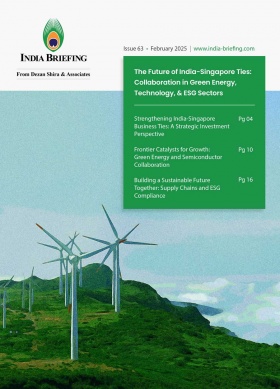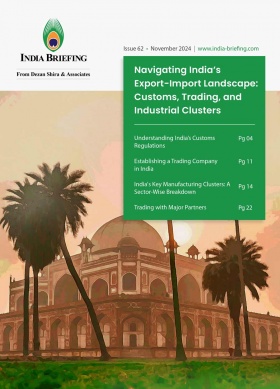India-Australia Deepen Economic Ties with Ambitious 2025 Roadmap
As India’s economic prominence continues to rise, it has emerged as a vital partner in Australia’s strategy to diversify its trade relationships and enhance economic security. In 2025, Australia introduced the New Roadmap for Australia’s Economic Engagement with India, a strategic plan focused on expanding trade and investment ties between the two countries.
Australia has unveiled an ambitious strategy aimed at deepening and broadening its trade and investment relationship with India. On February 26, 2025, Australian Prime Minister Anthony Albanese unveiled an ambitious roadmap to deepen and diversify its trade and investment ties with India.
The report, titled New Roadmap for Australia’s Economic Engagement with India, identifies nearly 50 targeted opportunities across sectors such as defense, sports, culture, space, and technology.
At the launch of the report, Australian Foreign Minister Penny Wong said that stronger economic ties with India would not only create employment for Australians but also contribute to a peaceful and prosperous Indo-Pacific region.
Three years of ECTA: India-Australia reflect on trade growth
On April 2, 2025, India and Australia commemorated the third anniversary of the Economic Cooperation and Trade Agreement (Ind-Aus ECTA). Since the agreement’s implementation, bilateral trade between the two nations has expanded to US$24 billion.
According to India’s Ministry of Commerce and Industry, trade relations have continued to grow, with Indian exports to Australia rising by 14 percent in the FY 2023-24 compared to FY 2022-23. The ministry further noted that this growth trajectory has persisted, with exports increasing by 4.4 percent between April 2024 and February 2025.
The central government recognizes the ECTA as a key driver in enhancing trade and investment, particularly in sectors such as textiles, pharmaceuticals, chemicals, and agriculture. Furthermore, India’s import of essential raw materials—including metalliferous ores, cotton, and wood products—has supported industrial growth, underscoring the complementary nature of the bilateral partnership.
Additionally, the Ministry highlighted the emergence of new export categories, such as calcined petroleum coke, high-capacity diesel generating sets, and air liquefaction machinery, signaling the expansion of trade opportunities.
Focus on high-potential sectors
The comprehensive dossier focuses on four key sectors—clean energy, education and skills, agribusiness, and tourism—which are expected to serve as the primary engines of future growth and cooperation between the two countries.
Albanese has emphasized that India is a critical partner as Australia seeks to diversify its trade relationships and enhance economic security. He underscored that this roadmap is essential to bolster the Australia-India partnership, which promises to create new business opportunities, generate jobs, and boost prosperity for both nations.
Australia is realigning its focus on sectors that hold the most promise for the future. The 2025 roadmap highlights four high-potential sectors that are expected to drive the next phase of the Australia-India economic relationship:
- Clean energy: Leveraging Australia’s expertise in renewable energy to support India’s sustainability goals and facilitate collaborative research and investment.
- Education and skills: Strengthening academic partnerships, enhancing vocational training programs, and promoting knowledge exchange to build a future-ready workforce.
- Agribusiness: Expanding agricultural trade, improving food security, and fostering agribusiness collaborations to meet India’s increasing demand for high-quality produce.
- Tourism: Promoting cultural exchanges, simplifying visa processes, and encouraging tourism initiatives to strengthen people-to-people ties and boost economic activity.
Australia-India economic partnership
In 2022, India and Australia implemented the first phase of a free trade agreement, the Australia-India Economic Cooperation and Trade Agreement (ECTA). According to industry experts, the agreement, which came into force on December 29, 2022, has delivered significant financial benefits to Australian businesses. By the end of 2025, the ECTA is projected to save Australian exporters approximately US$2 billion in tariffs.
Continuing this momentum, both countries are progressing toward a more comprehensive agreement—the Comprehensive Economic Cooperation Agreement (CECA)—which is expected to further deepen trade relations and unlock additional economic opportunities.
|
India-Australia Bilateral Trade, 2019-2024 (Value in US$ Million) |
|||||
|
Trade activities |
FY2019-20 |
FY2020-21 |
FY2021-22 |
FY2022-23 |
FY2023-24 |
|
India’s exports to Australia |
2,852.14 |
4,043.88 |
8,283.13 |
6,951.32 |
7,940.75 |
|
% Growth |
– |
41.78 |
104.83 |
-16.08 |
14.23 |
|
India’s imports from Australia |
9,782.22 |
8,247.30 |
16,756.17 |
19,011.31 |
16,159.20 |
|
% Growth |
– |
-15.69 |
103.17 |
13.46 |
-15.00 |
|
Total trade |
12,634.36 |
12,291.17 |
25,039.30 |
25,962.62 |
24,099.95 |
Source: Department of Commerce, Ministry of Commerce and Industry, GoI
Elevating diplomatic and business ties
India’s economic growth over the past two decades has positioned it as the fastest-growing major economy in the world, with an average annual growth rate of 6.4 percent, as per a March 2025 report. Ranked as the world’s fifth-largest economy as of 2025, India is projected to move up to third place by 2030, trailing only the US and China.
This rapid growth presents an opportunity for Australia to gain from India’s rising economic trajectory.
In July 2023, Australia deepened its engagement with India by opening a new Consulate-General in Bengaluru, India’s tech hub. This move, along with the establishment of the Centre for Australia-India Relations, has enhanced collaboration between businesses in both countries.
Hilary McGeachy, Australia’s first Consul General to Karnataka and Telangana, emphasized in a June 2024 interview that the continued implementation of the Australia-India Economic Cooperation and Trade Agreement (AI-ECTA) is unlocking new business opportunities and benefiting consumers in both countries. She highlighted India’s advancements in space, biotechnology, and information technology (IT), noting that Australia can leverage these developments while offering its expertise in return.
Additionally, Australia remains a key supplier of raw materials to India, reinforcing the economic foundation for continued collaboration and mutual growth.
India-Australia FDI trends
India has steadily increased its investment footprint in Australia, reflecting growing confidence in the Australian economy and expanding bilateral ties. According to data from the Australian Department of Foreign Affairs and Trade (DFAT), India ranked 15th among foreign investors in Australia in 2023. This marks a notable increase from A$29.2 billion in 2021, indicating a positive growth trajectory in India’s outbound investments.
|
India’s FDI in Australia |
|||||
|
FDI rank in 2023 |
Economy |
2021 (A$ billion) |
2022 (A$ billion) |
2023 (A$ billion) |
% of total |
|
15 |
India |
29.2 |
np |
47.3 |
1.0 |
Source: Department of Foreign Affairs and Trade, Australian Government
While the percentage of India’s total FDI in Australia remains relatively modest at 1 percent, the rising trend highlights India’s growing interest in sectors such as resources, technology, infrastructure, and services.
Australia’s FDI in India, though comparatively smaller, has shown consistent interest in high-potential sectors. As of December 2024, Australia’s cumulative FDI in India amounted to US$1.52 billion, accounting for 0.21 percent of India’s total FDI equity inflows.
|
Australia’s FDI in India from April 2000 to December 2024 |
||
|
Country |
FDI value (in US$ million) |
% of total FDI equity inflows |
|
Australia |
1,517.10 |
0.21 |
Source: India’s FDI Fact Sheet, Department for Promotion of Industry and Internal Trade, GoI.
Australian investments in India have primarily focused on sectors such as education, infrastructure, financial services, and renewable energy.
READ: Australia’s Strategic Investments in India’s Fintech, Space Sectors
Clean energy promotion between India and Australia
On 19 November 2024, Australia and India launched the India-Australia Renewable Energy Partnership, with the aim to promote collaboration in the renewable energy sector and stimulate two-way investment. Under this initiative, the India-Australia Rooftop Solar Training Academy will be established in India in 2025, in which Australian experts will train 2000 women and young people as solar technicians.
The signing of the Migration and Mobility Partnership Arrangement (MMPA) has enhanced and supported two-way migration, fostering workforce mobility and knowledge exchange. This agreement is designed to strengthen ties between the people of both nations and facilitate the movement of skilled professionals and students, thereby contributing to the long-term growth of the bilateral relationship.
The MMPA between India and Australia is a bilateral agreement aimed at enhancing mobility for students, professionals, and skilled workers between the two countries. Signed on May 23, 2023, during Indian Prime Minister Narendra Modi’s visit to Australia, the arrangement seeks to facilitate smoother migration processes while preventing irregular migration and ensuring ethical recruitment practices.
Harnessing full potential of the partnership
As both countries continue to strengthen their economic ties, the evolving partnership is poised to deliver long-term, sustainable benefits. By focusing on sectors with the highest growth potential and addressing emerging challenges, Australia and India are well-positioned to unlock new opportunities and foster a resilient and prosperous economic future. With the right strategy and continued collaboration, the partnership holds the potential to create lasting positive impacts for both countries, driving growth and prosperity for years to come.
(This article was originally published on March 28, 2025. It has since been updated April3, 2025.)
About Us
India Briefing is one of five regional publications under the Asia Briefing brand. It is supported by Dezan Shira & Associates, a pan-Asia, multi-disciplinary professional services firm that assists foreign investors throughout Asia, including through offices in Delhi, Mumbai, and Bengaluru in India. Readers may write to india@dezshira.com for support on doing business in India. For a complimentary subscription to India Briefing’s content products, please click here.
Dezan Shira & Associates also maintains offices or has alliance partners assisting foreign investors in China, Hong Kong SAR, Dubai (UAE), Indonesia, Singapore, Vietnam, Philippines, Malaysia, Thailand, Bangladesh, Italy, Germany, the United States, and Australia.
- Previous Article Claiming Foreign Tax Credit in India: Step-by-Step Guide to Form 67 Compliance
- Next Article 印度将于2025年4月1日起实施GST重大改革:强制ISD注册新规全面解析








